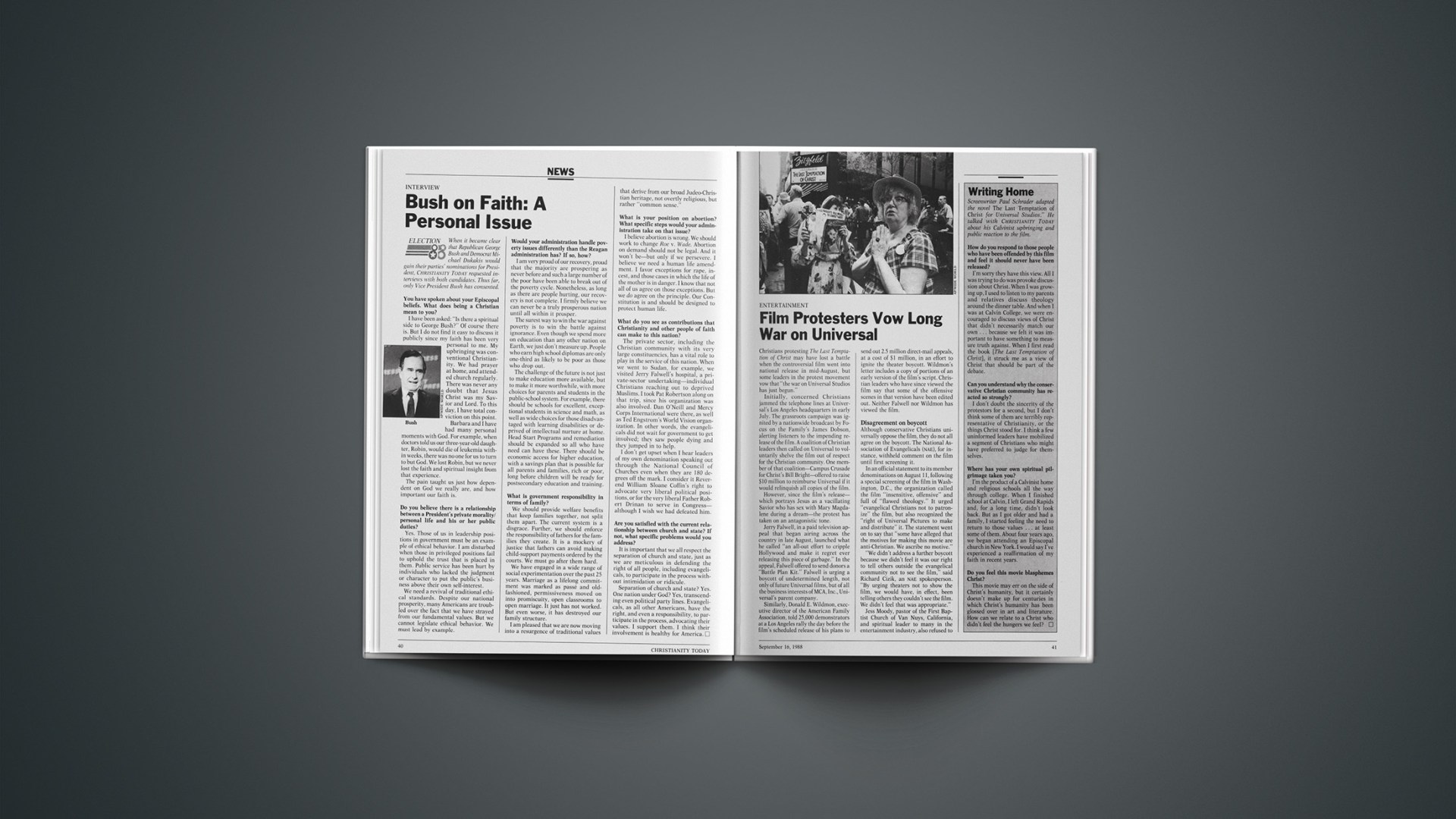ENTERTAINMENT
Christians protesting The Last Temptation of Christ may have lost a battle when the controversial film went into national release in mid-August, but some leaders in the protest movement vow that “the war on Universal Studios has just begun.”
Initially, concerned Christians jammed the telephone lines at Universal’s Los Angeles headquarters in early July. The grassroots campaign was ignited by a nationwide broadcast by Focus on the Family’s James Dobson, alerting listeners to the impending release of the film. A coalition of Christian leaders then called on Universal to voluntarily shelve the film out of respect for the Christian community. One member of that coalition—Campus Crusade for Christ’s Bill Bright—offered to raise $10 million to reimburse Universal if it would relinquish all copies of the film.
However, since the film’s release—which portrays Jesus as a vacillating Savior who has sex with Mary Magdalene during a dream—the protest has taken on an antagonistic tone.
Jerry Falwell, in a paid television appeal that began airing across the country in late August, launched what he called “an all-out effort to cripple Hollywood and make it regret ever releasing this piece of garbage.” In the appeal, Falwell offered to send donors a “Battle Plan Kit.” Falwell is urging a boycott of undetermined length, not only of future Universal films, but of all the business interests of MCA, Inc., Universal’s parent company.
Similarly, Donald E. Wildmon, executive director of the American Family Association, told 25,000 demonstrators at a Los Angeles rally the day before the film’s scheduled release of his plans to send out 2.5 million direct-mail appeals, at a cost of $1 million, in an effort to ignite the theater boycott. Wildmon’s letter includes a copy of portions of an early version of the film’s script. Christian leaders who have since viewed the film say that some of the offensive scenes in that version have been edited out. Neither Falwell nor Wildmon has viewed the film.
Writing Home
Screenwriter Paul Schrader adapted the novel The Last Temptation of Christ for Universal Studios.” He talked with CHRISTIANITY TODAY about his Calvinist upbringing and public reaction to the film.
How do you respond to those people who have been offended by this film and feel it should never have been released?
I’m sorry they have this view. All I was trying to do was provoke discussion about Christ. When I was growing up, I used to listen to my parents and relatives discuss theology around the dinner table. And when I was at Calvin College, we were encouraged to discuss views of Christ that didn’t necessarily match our own … because we felt it was important to have something to measure truth against. When I first read the book [The Last Temptation of Christ], it struck me as a view of Christ that should be part of the debate.
Can you understand why the conservative Christian community has reacted so strongly?
I don’t doubt the sincerity of the protestors for a second, but I don’t think some of them are terribly representative of Christianity, or the things Christ stood for. I think a few uninformed leaders have mobilized a segment of Christians who might have preferred to judge for themselves.
Where has your own spiritual pilgrimage taken you?
I’m the product of a Calvinist home and religious schools all the way through college. When I finished school at Calvin, I left Grand Rapids and, for a long time, didn’t look back. But as I got older and had a family, I started feeling the need to return to those values … at least some of them. About four years ago, we began attending an Episcopal church in New York. I would say I’ve experienced a reaffirmation of my faith in recent years.
Do you feel this movie blasphemes Christ?
This movie may err on the side of Christ’s humanity, but it certainly doesn’t make up for centuries in which Christ’s humanity has been glossed over in art and literature. How can we relate to a Christ who didn’t feel the hungers we feel?
Disagreement On Boycott
Although conservative Christians universally oppose the film, they do not all agree on the boycott. The National Association of Evangelicals (NAE), for instance, withheld comment on the film until first screening it.
In an official statement to its member denominations on August 11, following a special screening of the film in Washington, D.C., the organization called the film “insensitive, offensive” and full of “flawed theology.” It urged “evangelical Christians not to patronize” the film, but also recognized the “right of Universal Pictures to make and distribute” it. The statement went on to say that “some have alleged that the motives for making this movie are anti-Christian. We ascribe no motive.”
“We didn’t address a further boycott because we didn’t feel it was our right to tell others outside the evangelical community not to see the film,” said Richard Cizik, an NAE spokesperson. “By urging theaters not to show the film, we would have, in effect, been telling others they couldn’t see the film. We didn’t feel that was appropriate.”
Jess Moody, pastor of the First Baptist Church of Van Nuys, California, and spiritual leader to many in the entertainment industry, also refused to prejudge the film. But after seeing it, he agreed it ought to be boycotted, though he stopped short of declaring war on Hollywood. “No film has ever captured the miracles and crucifixion of Jesus more beautifully than this one. But no film has ever been so full of bologna about Jesus in history,” Moody said.
Although box office receipts indicated healthy attendance in the film’s first few weeks of release, Universal appeared to be stepping lightly with the general public by keeping it limited to a small number of theaters. Additionally, five theater chains, including two of the nation’s largest—MGM/UA Entertainment Company and General Cinema Corporation—announced a decision not to screen the movie in any of their theaters. MGM/UA, however, announced later that it would carry the film in some of its specialty art theaters.
By Brian Bird in Hollywood.










